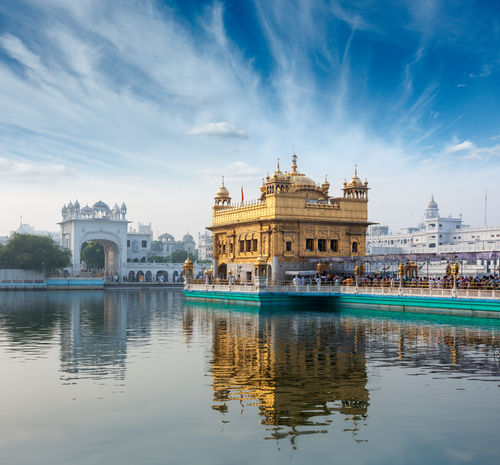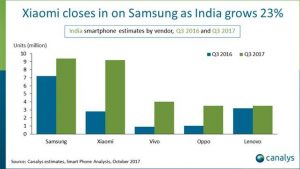
India overtook the US to become the world’s second largest smartphone market after China, as shipments grew 23 per cent year-on-year in Q3 2017 to just over 40 million units, Canalys stated.
“There are close to 100 mobile device brands sold in India, with more vendors arriving every quarter. In addition, India has one of the most complex channel landscapes, but with low barriers to entry,” explained Canalys research analyst Ishan Dutt, adding growth will continue thanks to low smartphone penetration and the “explosion of LTE”.
Vendors
Samsung shipped 9.4 million smartphones in Q3 2017, up from around 7 million in Q3 2016, while Xiaomi registered an even bigger jump, going from under 3 million units to 9.2 million, a whopping 290 per cent increase (see chart below, click to enlarge).

The two vendors accounted for almost half of the total market, with Vivo, Oppo and Lenovo making up the top five in the country. Together, they make up 75 per cent of total shipments.
Canalys analyst Rushabh Doshi said: “Xiaomi’s growth is a clear example of how a successful online brand can effectively enter the offline market while maintaining low overheads.”
“But Xiaomi focuses on the low end. It struggles in the mid-range – devices priced between INR15,000 [$230] and INR20,000 – where Samsung, Oppo and Vivo are particularly strong.
Nevertheless, we predict Xiaomi’s continued go-to-market innovations will allow it to overtake Samsung within a couple of quarters,” he added.
Apple began producing devices in India in May, and its iPhone shipments more than doubled year-on-year to 900,000 units in Q3 2017: “impressive growth in a market that is skewed toward low-end smartphones,” Canalys stated in a report.
Earlier this month it was reported Apple could be nearing a deal with the government allowing it to open retail stores in India. Currently it sells its products through authorised resellers.
Overcoming challenges
Canalys said the introduction of a goods and services tax (GST) in India during 2017, and the removal of high-value currency notes from circulation meant the market experienced “a wobble”, but is showing strong signs of stability as vendors adapt to the new rules.
Doshi said: “The Indian economy is proving very strong in the second half of 2017, now that the twin shocks of GST and demonetisation are behind it.”
“Reduced indirect taxes have added new equity to the market, with distributors and retailers able to serve areas beyond their home regions as inter-state operations become easier. As the infrastructure matures, consolidation in distribution is inevitable,” he added.
Canalys’ figures are in line with an earlier IDC prediction the smartphone market would recover in Q3, following sluggish growth in Q2.
At the time, Jaipal Singh, a senior analyst at IDC India, said: “Sentiment is indeed positive in the market. All the ambiguities have cleared now, and vendors are gearing up for the upcoming [Diwali] festival season to recover from the slow start in the first half of this year,”
